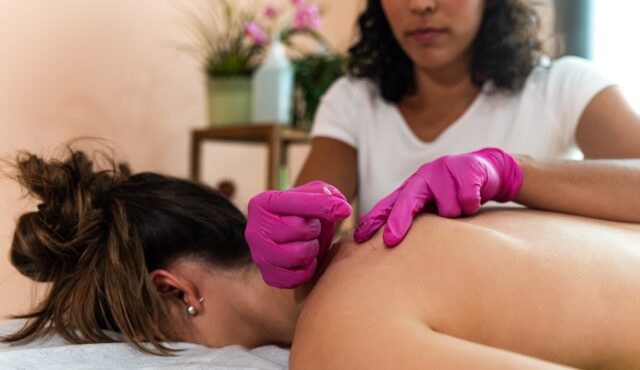Some people may choose to try acupuncture—a healing treatment rooted in Traditional Chinese Medicine (TCM)—because it has fewer risks and side effects than more traditional menopause treatments (more on this later). With a skilled practitioner, it’s generally safe and not only helps you relax but potentially eases a variety of ailments. Better yet, the science seems to show that it works.
In other words? If you’re looking for a path to menopause relief, you have nothing to lose by giving it a try. Read on to learn all the benefits of this alternative medicine for menopause and where to find an acupuncturist with the right experience.
6 menopause symptoms that may be relieved with acupuncture
During menopause, the loss of estrogen can affect so many systems in your body and trigger a slew of unpleasant symptoms. Fortunately, acupuncture may alleviate many of these side effects. Here’s how:
1. Hot flashes and night sweats
“When things are out of whack in the body, the body will find ways to get our attention or give ‘signals,’” Haley Parker, DOM, LAc, HFS, a lead acupuncturist at VUIM Clinic and clinical director at the Virginia University of Integrated Medicine, tells Well+Good. Through the lens of TCM, “hot flashes are like a ‘warning light’ in the car saying that it needs more ‘cooling yin’ to balance the heat,” Parker says.
By stimulating specific points on the body, acupuncture may support this balance by helping to “regulate the endocrine system, leading to more stable hormone levels,” Parker says. It’s also thought to help promote a healthy liver, “which is involved in over 500 functions of the body, especially hormone regulation and detoxification,” she says.
On top of keeping your hormones in harmony, acupuncture can also help “reduce the body’s stress response, which often triggers hot flashes and night sweats,” Parker says.
While there’s not much current research, one 2010 study in Menopause found that just 12 sessions of acupuncture (along with typical menopause care) significantly reduced the frequency and severity of hot flashes1 in perimenopausal and menopausal people.
2. Sleep quality
Between hormone shifts, hot flashes, night sweats, and mood changes, your sleep may suffer during the menopause transition. But acupuncture sessions may help you get more quality sleep.
Acupuncture is thought to promote the body’s natural circadian rhythms and “help normalize the sleep-wake cycle by affecting melatonin production,” Parker says. Though it’s still not clear how it works, the thought is that acupuncture may support the release of melatonin—a hormone that helps you feel calm and sleepy.
Acupuncture may also help control the body’s stress response, alleviate anxiety, and have a relaxing effect by supporting “the parasympathetic function of the nervous system,” Parker says. The parasympathetic system is your body’s “rest/digest” mode (i.e., the opposite of “fight or flight”) “where true healing and cellular repair can occur,” she says. By triggering the release of endorphins (i.e., “feel-good” chemicals) and certain neurotransmitters, acupuncture helps “to regulate and balance the sympathetic states.”
This is all good news for sleep: Researchers found that acupuncture significantly improved sleep quality2 in perimenopausal people with insomnia.
3. Mood swings
With all the hormonal changes happening in your body, it’s no surprise that your moods can be all over the place in menopause. But acupuncture can help you feel more level (or even lift your mood) in several ways.
First, acupuncture helps “stimulate the release of endorphins and other mood-regulating neurotransmitters,” Parker says. In doing so, it “can improve emotional stability and reduce anxiety and depression,” she says. Secondly, acupuncture can also “help lower stress hormones, promoting a more balanced emotional state,” Parker says.
Thirdly, as mentioned earlier, acupuncture supports the liver. “In Chinese Medicine, this organ is in charge of ‘smooth flow’ of qi [i.e., the body’s vital energy] and also the emotions,” Parker says. “When the liver energy is ‘clogged’ or stagnant, the mood is affected.” By helping the liver function at its best, you also help with mood and mental health.
Case in point: a January 2020 meta-analysis found that acupuncture was a safe, effective treatment3 (even more so than antidepressants) for people with perimenopausal depression.
4. Joint and muscle pain
They’re not talked about as much, but achy joints or muscles are pretty common in menopause. More than 70 percent of perimenopausal and menopausal people will have musculoskeletal symptoms4 due to the loss of estrogen (and a quarter will even be disabled by them).
Thankfully, there are effective ways to manage these pains—like acupuncture! It helps “improve blood circulation and releases endorphins [i.e., the body’s natural painkillers], providing relief from joint pain” and other types of pain, including headaches, Parker says.
Plus, if you have chronic pain related to things like osteoarthritis, for example, acupuncture can be a useful “complementary approach to managing long-term pain conditions,” she says.
5. Low libido
Everyone’s sex drive is different during menopause (i.e., it may slow down or speed up). One reason being the loss of estrogen can lead to vaginal dryness, which can make sex painful.
If your libido is lacking for whatever reason, and it bothers you, acupuncture can help. The practice is thought to increase blood flow and circulation to your tissues, which may improve sexual function and desire, Parker says. Additionally, “acupuncture helps maintain hormonal balance, which is essential for sexual health,” she says. Plus, it could help musculoskeletal pain, which often deters you from feeling frisky, Parker adds.
One study found that acupuncture significantly improved sexual desire7, arousal, vaginal lubrication, sexual satisfaction, and dyspareunia (pain during sex) in people with female sexual dysfunction (FSD). However, the participants weren’t going through menopause; more research is needed to see if the treatment has similar effects for menopausal people.
6. Digestive and gut issues
Another thing no one tells you about menopause? Certain GI issues—like bloating, constipation, diarrhea, gassiness, and acid reflux—are associated with menopausal symptoms8.
According to Parker, acupuncture can support your digestive and gut health in the following ways:
- Certain acupuncture points may stimulate digestive organs. This enhances their function and reduces inflammation.
- Acupuncture may support healthy gut motility9 (i.e., the pace at which food is digested and moves through your body). This, in turn, can help reduce symptoms like bloating and discomfort—which may happen if your gut is sluggish and food hangs around for too long.
- Acupuncture may help to lower inflammation in the gut. By modulating the immune system, acupuncture can reduce the production of pro-inflammatory cytokines (i.e., proteins) and increase anti-inflammatory cytokines, Parker says. There isn’t much research to support this, but Parker says some studies have found that acupuncture reduces inflammatory markers in people with irritable bowel syndrome (IBS)—a condition often associated with gut inflammation.
This is all good for your brain, too. “Ever heard of the “brain-gut” connection? The gut is also where the majority of the neurotransmitters are made, and so a happy gut corresponds to a happy brain,” Parker says.
Not everyone is a good candidate for acupuncture. Talk to your healthcare provider before trying acupuncture if you have a bleeding disorder, a pacemaker, a metal allergy, breast implants, or if you are pregnant or at risk for infection.
How to find an acupuncturist that deals with menopause
Not every acupuncturist has expertise or experience treating menopausal people. You might have to do a little research to find a practitioner who’s the right fit. Here are a few places to search:
Ask your network
“I always think word of mouth is the best way,” Parker says. Try asking your primary healthcare providers for referrals, as well as your friends, family members, or colleagues for recommendations. They may even tell you who not to go to based on their experiences.
Use directories from professional acupuncture organizations
These organizations can help you find a reputable acupuncturist in your area. Here are some good places to start:
Search online reviews
“Websites like Healthgrades, Zocdoc, or Yelp can provide reviews and ratings of local acupuncturists,” Parker says. “Practitioners who have a track record of successfully treating menopause symptoms are ideal.”
Call local clinics and wellness centers in your area
“Many Traditional Chinese Medicine (TCM) clinics have acupuncturists who are well-versed in treating hormonal imbalances and menopause,” Parker says. Likewise, holistic health centers or wellness clinics that offer acupuncture services “often have practitioners experienced in treating menopause symptoms,” she adds.
Once you’ve found a potential practitioner, you should always schedule a consultation to see if they’re the right fit. During the consult, take the opportunity to “discuss your specific menopause symptoms and see if the acupuncturist has experience and success in treating those issues,” Parker says.
Here are a few sample questions to ask during your interview:
- Experience: How long have you been practicing acupuncture, and how much experience do you have in treating women’s health issues, hormonal imbalances, and menopause symptoms?
- Approach: What is your approach to treating menopause symptoms with acupuncture? Do you use any specific techniques or points?
- Success stories: Can you share any success stories or testimonials from people who have undergone treatment for menopause symptoms?
- Credentials: Are you licensed and certified by a recognized professional organization, such as the NCCAOM?
- Complementary therapies: Do you recommend any complementary therapies (like herbal supplements) along with acupuncture for treating menopause symptoms? (Parker says, “The answer should be yes.” Because each person’s needs and menopausal symptoms vary, the practitioner will work with you to tailor the treatment for your specific situation.)
Other ways to manage menopause symptoms
While acupuncture can be an amazing therapy for menopause relief, like any treatment, it might not work for everyone. That’s why it’s good to be familiar with the entire menu of menopause treatment options.
“As an acupuncturist, I try to stay on the natural side as much as possible,” Parker says. “However, a little mix of east and west does not hurt.” Sometimes, a combination of approaches is what works best.
Here are some other menopause treatment options to consider—including traditional medical treatments, lifestyle changes, and other alternative remedies. Whichever you try, acupuncture is generally safe to do as a complementary therapy.
1. Hormone therapy (HT)
“HT involves taking medications containing female hormones to replace the ones the body no longer makes after menopause,” Parker says. “It can be very effective in reducing hot flashes, night sweats, and vaginal dryness, and it can also help prevent bone loss.”
Still, HT isn’t right for everyone, Parker says. While it may be beneficial for some, it can slightly raise your risk of developing breast cancer, heart disease, stroke, blood clots, and/or dementia in certain people. Ask your healthcare provider if you’re a good candidate for HT.
2. Vaginal estrogen
“Low-dose vaginal estrogen [available as creams, tablets, or rings] can help relieve vaginal dryness, discomfort during intercourse, and some urinary symptoms,” Parker says. Compared to HT, the dose of estrogen is usually lower, so it doesn’t circulate throughout your blood to the same degree. This means it won’t significantly affect breast and endometrial cells. When these cells are stimulated by estrogen, it can increase your risk of breast cancer and endometrial cancer.
While vaginal estrogen is generally safe as a temporary treatment, your healthcare provider may want to keep track of your endometrial tissue to make sure there are no concerning changes.
3. Non-hormonal medications and topicals
Estrogen therapy isn’t the only type of medication used to treat menopause symptoms. Other drugs—that don’t affect your hormones—can be helpful, too. Some oral medications include the following:
- Antidepressants: “Certain antidepressants, such as SSRIs and SNRIs, can help reduce hot flashes and improve mood.” Parker says.
- Clonidine: “A medication typically used for high blood pressure, clonidine can also help with hot flashes,” Parker says.
- Gabapentin: “Originally used for treating seizures, gabapentin can help reduce hot flashes,” Parker says.
You could also try a topical medication called Replens. It’s an over-the-counter, non-estrogen moisturizer that you insert in the vagina up to three times per week, which can help with vaginal dryness and discomfort during sex. It sticks to the vaginal surface, releases water, enhances moisture in vaginal tissue, and may restore vaginal pH.
Again, always chat with your healthcare provider about possible risks and whether these medicines may be a good fit for you.
4. A balanced diet
“Focus on a balanced diet rich in fruits, vegetables, whole grains, lean proteins, and healthy fats,” Parker says. You can also add foods like soy, flaxseeds, and legumes, which have phytoestrogens. These plant-based compounds “mimic estrogen in the body,” she says. However, the research is limited12 on whether or not phytoestrogens can balance your hormones or ease menopause symptoms13.
Ask your healthcare provider about whether adding phytoestrogens to your diet is right for you and what the ideal amount to get per day should be.
5. Regular exercise
“Exercise can help manage weight, improve mood, enhance sleep quality, and strengthen bones,” Parker says. These things are always important, but they’re especially essential during menopause. A mix of aerobic activities, strength training, and flexibility exercises (like yoga or Pilates) is a smart strategy.
6. Stress management
Stress can trigger symptoms like hot flashes and night sweats, so managing it is key to keeping these issues in check. “Practices such as mindfulness, meditation, and deep breathing exercises can reduce stress and improve emotional well-being,” Parker says.
Similarly, “cognitive-behavioral therapy (CBT) and other counseling methods can help manage mood swings, anxiety, and depression,” she says.
Mind-body practices like yoga, tai chi, and qigong are also terrific tools for stress reduction (as well as increased mental clarity, improved flexibility, and better balance), Parker says.
7. Sleep hygiene
Menopause symptoms can make it difficult to drift off to dreamland. To sleep better, you’ll want to start with a solid bedtime routine. Here are Parker’s tips for better sleep quality:
- Maintain a regular sleep schedule by going to bed and waking up at the same time every day.
- Create a comfortable sleep environment by keeping the bedroom cool, dark, and quiet.
- Practice relaxation techniques before bedtime, like reading, taking a warm bath, or doing gentle yoga.
8. Herbal supplements
In TCM, herbs are another natural remedy used to relieve menopause symptoms. If your acupuncturist is also an herbalist, Parker says they can create treatments and formulas specifically designed for you, your symptoms, and your overall health.
According to Parker, certain herbs can be used for menopause relief. Just keep in mind: herbal remedies are not FDA-regulated and are not as thoroughly clinically tested as traditional medications. Always talk to your healthcare provider first before trying any herbal remedy, including the following:
Some other herbs TCM often implements for menopause include dong quai, adaptogens, Chinese yam, and goji berry, among others, per Parker.
While it may be tempting to go out and buy these herbs and try to treat yourself, it’s best to consult a professional who’s well-versed in herbal medicine. According to Parker, they can recommend quality products and tailor a formula to your needs. They can also make sure that no prescription medications you’re taking interact with herbal remedies.
9. Massage therapy
A relaxing massage is another natural way to relieve menopause-related symptoms. Massage “can help reduce muscle tension, improve circulation, and promote relaxation,” Parker says. “Various techniques such as Swedish, deep tissue, and aromatherapy massage can be beneficial.”
When to see a healthcare provider
There’s no need to wait when it comes to getting relief from menopause symptoms. You shouldn’t have to “muscle through” the transition. Let your healthcare provider know about your symptoms, and if you’re interested in natural alternatives, consider giving acupuncture a try. It has fewer risks and side effects overall and may help a variety of physical, mental, and emotional symptoms associated with menopause.
“Remember, you are going through a transition into a new stage of life,” Parker says. “It is normal [but] the symptoms do not have to be, and they will eventually even out with the right tools.”
Well+Good articles reference scientific, reliable, recent, robust studies to back up the information we share. You can trust us along your wellness journey.
-
Kim, Kun Hyung, et al. “Effects of acupuncture on hot flashes in perimenopausal and postmenopausal women-a multicenter randomized clinical trial.” Menopause, vol. 17, no. 2, Mar. 2010, pp. 269–280, https://doi.org/10.1097/gme.0b013e3181bfac3b. -
Cong Fu, Na Zhao, Zhen Liu, Lu-hua Yuan, Chen Xie, Wen-jia Yang, Xin-tong Yu, Huan Yu, Yun-fei Chen, Acupuncture Improves Peri-menopausal Insomnia: A Randomized Controlled Trial, Sleep, Volume 40, Issue 11, November 2017, zsx153, https://doi.org/10.1093/sleep/zsx153 -
Xiao, Xiao et al. “Effectiveness and Safety of Acupuncture for Perimenopausal Depression: A Systematic Review and Meta-Analysis of Randomized Controlled Trials.” Evidence-based complementary and alternative medicine : eCAM vol. 2020 5865697. 19 Jan. 2020, doi:10.1155/2020/5865697 -
Wright, V. J., Schwartzman, J. D., Itinoche, R., & Wittstein, J. (2024). The musculoskeletal syndrome of menopause. Climacteric, 1–7. https://doi.org/10.1080/13697137.2024.2380363 -
Takayama, Shin et al. “Evaluation of the effects of acupuncture on blood flow in humans with ultrasound color Doppler imaging.” Evidence-based complementary and alternative medicine : eCAM vol. 2012 (2012): 513638. doi:10.1155/2012/513638 -
Ko, Jade Heejae, and Seung-Nam Kim. “A Literature Review of Women’s Sex Hormone Changes by Acupuncture Treatment: Analysis of Human and Animal Studies.” Evidence-based complementary and alternative medicine : eCAM vol. 2018 3752723. 15 Nov. 2018, doi:10.1155/2018/3752723 -
Zhang, Jun Tan, et al. “Clinical study on the use of acupuncture for the treatment of female sexual dysfunction: A pilot study.” Sexual Medicine, vol. 10, no. 4, 20 June 2022, pp. 100541–100541, https://doi.org/10.1016/j.esxm.2022.100541. -
Brimienė, Ieva, et al. “Exploration of the association between menopausal symptoms, gastrointestinal symptoms, and perceived stress: Survey-based analysis.” Menopause, 3 Oct. 2023, https://doi.org/10.1097/gme.0000000000002259. -
Yin, Jieyun, and Jiande D Z Chen. “Gastrointestinal motility disorders and acupuncture.” Autonomic neuroscience : basic & clinical vol. 157,1-2 (2010): 31-7. doi:10.1016/j.autneu.2010.03.007 -
Opal, S M, and V A DePalo. “Anti-inflammatory cytokines.” Chest vol. 117,4 (2000): 1162-72. doi:10.1378/chest.117.4.1162 -
Desmawati, Desmawati, and Delmi Sulastri. “Phytoestrogens and Their Health Effect.” Open access Macedonian journal of medical sciences vol. 7,3 495-499. 14 Feb. 2019, doi:10.3889/oamjms.2019.044 -
Domínguez-López, Inés et al. “Effects of Dietary Phytoestrogens on Hormones throughout a Human Lifespan: A Review.” Nutrients vol. 12,8 2456. 15 Aug. 2020, doi:10.3390/nu12082456 -
Desmawati, Desmawati, and Delmi Sulastri. “Phytoestrogens and Their Health Effect.” Open access Macedonian journal of medical sciences vol. 7,3 495-499. 14 Feb. 2019, doi:10.3889/oamjms.2019.044 -
Vidović, Bojana B et al. “Health Benefits and Applications of Goji Berries in Functional Food Products Development: A Review.” Antioxidants (Basel, Switzerland) vol. 11,2 248. 27 Jan. 2022, doi:10.3390/antiox11020248 -
Kazemi, Farideh et al. “The Effect of Evening Primrose Oil Capsule on Hot Flashes and Night Sweats in Postmenopausal Women: A Single-Blind Randomized Controlled Trial.” Journal of menopausal medicine vol. 27,1 (2021): 8-14. doi:10.6118/jmm.20033










